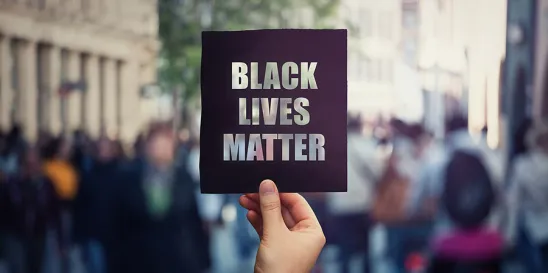The National Labor Relations Board (“NLRB”), in a 3-1 decision, held that an employee’s display on their work uniform of “BLM,” an acronym for Black Lives Matter, constituted protected concerted activity under Section 7 of the National Labor Relations Act (“Act”). Accordingly, the NLRB reversed an Administrative Law Judge (“ALJ”) decision, and found that the employer (Home Depot) violated Section 8(a)(1) of the Act by directing the employee to remove the BLM insignia because it violated the company’s uniform policy. The employee resigned instead of removing the insignia from their uniform.
Procedural History
In June 2022, an ALJ found that the employer did not violate the Act by requiring the employee to remove the BLM messaging, because the insignia lacked “an objective, and sufficiently direct, relationship to terms and conditions of employment.” The ALJ concluded that the BLM messaging was “primarily used, and generally understood, to address the unjustified killings of Black individuals by law enforcement and vigilantes … [and] while a matter of profound societal importance, is not directly relevant to the terms, conditions, or lot of Home Depot’s employees as employees.” (emphasis in original).
Further, the ALJ determined that the employee’s motivation for displaying the BLM message (i.e., their dissatisfaction with their treatment as employees) was not relevant. The petitioner sought review before the NLRB.
NLRB Finds Wearing BLM Insignia at Work Constitutes Protected Activity
On review, the NLRB concluded that the employee’s refusal to remove the BLM insignia was protected concerted activity under Section 7 of the Act because the activity was for “mutual aid or protection,” as it was a “logical outgrowth” of the employee’s and other employees’ complaints about race discrimination in the workplace that allegedly occurred over the preceding months.
According to the NLRB, an individual employee’s actions are a “logical outgrowth” of the concerns expressed by the group where “the record shows the existence of a group complaint,” even though “the employees acted individually and without coordination.” In this case, the fact that the group complaints post-dated the employee’s initial display of the BLM insignia was not dispositive. Instead, and contrary to the ALJ’s conclusion, the NLRB focused on whether the employee’s subsequent refusal to remove the BLM insignia was a “logical outgrowth” of the prior protected concerted activity.
Additionally, the NLRB found that no special circumstances existed, such that there was a sufficient justification for the company to preclude their employees from wearing such insignia. For instance, this was not a situation where display of the insignia might jeopardize employee safety, exacerbate employee dissention, or unreasonably interfere with the company’s public image. In this regard, the NLRB concluded that the company’s public image was not at issue because it encourages employees to customize their uniforms. Likewise, the NLRB held that the company failed to put forth evidence of any non-speculative imminent risks to employee safety from the public and/or any violent or disruptive acts or threats thereof by other employees connected to the BLM insignia.
The NLRB ordered the employer to, among other things, (1) cease and desist from prohibiting employees from taking part in “protected concerted activities,” such as displaying “Black Lives Matter” insignia on their uniform aprons; (2) reinstate the employee without prejudice and compensate him for lost back pay and any adverse tax consequences; and (3) post notice of the decision for 60 days at the store where the dispute arose. The company may still appeal the Board’s decision to a federal appeals court.
Significantly, the NLRB declined to adopt a broader objective advanced by the NLRB General Counsel that protesting civil rights issues on the job is “inherently concerted” activity that is protected by Section 7 of the Act. The fact-intensive reasoning behind the NLRB’s decision here reflects that the underlying circumstances in each situation will play a significant role in the legal outcome as to whether the conduct at issue is protected, and it is not advisable to adopt a broad, one-size fits all rule from this decision.



 />i
/>i

